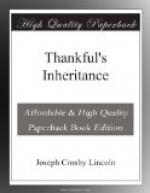Seen by daylight and in the glorious sunshine the old Barnes house did look, as their guide said, more “lifelike and cheerful.” A big, rambling, gray-gabled affair, of colonial pattern, a large yard before it and a larger one behind, the tumble-down shed in which General Jackson had been tethered, a large barn, also rather tumble-down, with henhouses and corncribs beside it and attached to it in haphazard fashion. In the front yard were overgrown clusters of lilac and rose bushes and, behind the barn, was the stubble of a departed garden. Thankful looked at all these.
“So that’s it,” she said.
“That’s it,” said Captain Obed. “What do you think of it?”
“Humph! Well, there’s enough of it, anyhow, as the little boy said about the spring medicine. What do you think, Emily?”
Emily’s answer was prompt and emphatic.
“I like it,” she declared. “It looks so different this morning. Last night it seemed lonesome and pokey and horrid, but now it is almost inviting. Think what it must be in the spring and summer. Think of opening those upper windows on a summer morning and looking out and away for miles and miles. It would be splendid!”
“Um—yes. But spring and summer don’t last all the time. There’s December and January and February to think of. Even March ain’t all joy; we’ve got last night to prove it by. However, it doesn’t look quite so desperate as I thought it might; I’ll give in to that. Last night I was about ready to sell it for the price of a return ticket to South Middleboro. Now I guess likely I ought to get a few tradin’ stamps along with the ticket. Humph! This sartin isn’t all Poverty Lane, is it? That place wa’n’t built with tradin’ stamps. Who lives there?”
She was pointing to the estate adjoining the Barnes house and fronting the sea further on. “Estate” is a much abused term and is sometimes applied to rather insignificant holdings, but this one deserved the name. Great stretches of lawns and shrubbery, ornamental windmill, greenhouses, stables, drives and a towered and turreted mansion dominating all.
“I seem to have aristocratic neighbors, anyhow,” observed Mrs. Barnes. “Whose tintype belongs in that gilt frame?”
Captain Obed chuckled at the question.
“Why, nobody’s just now,” he said. “There was one up to last fall, though I shouldn’t have called him a tintype. More of a panorama, if you asked me—or him, either. That place belonged to our leadin’ summer resident, Mr. Hamilton Colfax, of New York. There’s a good view from there, too, but not as fine as this one of yours, Mrs. Barnes. When your uncle, Cap’n Abner, bought this old house it used to set over on a part of that land there. The cap’n didn’t like the outlook so well as the one from here, so he bought this strip and moved the house down. Quite a job movin’ a house as old as this one.




